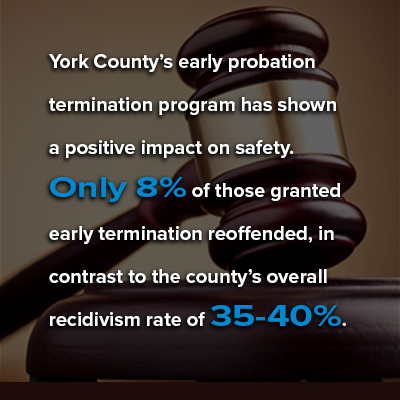Pennsylvania’s economic recovery from the COVID-19 pandemic requires a multi-tiered strategy whereby we’ll focus on efforts to boost the Commonwealth’s competitiveness, modernize our infrastructure network and ensure that our workforce is skilled, inspired and equipped to compete in today’s global economy. Filling our workforce shortage is a complex strategy as well – it not only means educating students about various career pathways but also offering second chances to those who are too often marginalized and looking to get back into the workforce and make their way into a rewarding career.
 In a recent op-ed, PA Chamber President and CEO Gene Barr makes the case as to why lawmakers should enact probation reform this session as a part of Pennsylvania’s workforce development solution. In the immediate term, allowing those in the probation system to re-enter the workforce would help fill pandemic-related job gaps. In the long term, employers would be given a different pool of candidates to tap from when hiring opportunities open, and those coming out of the system would be given the hope and possibility that comes with a fresh start, greatly reducing their chances at recidivism.
In a recent op-ed, PA Chamber President and CEO Gene Barr makes the case as to why lawmakers should enact probation reform this session as a part of Pennsylvania’s workforce development solution. In the immediate term, allowing those in the probation system to re-enter the workforce would help fill pandemic-related job gaps. In the long term, employers would be given a different pool of candidates to tap from when hiring opportunities open, and those coming out of the system would be given the hope and possibility that comes with a fresh start, greatly reducing their chances at recidivism.
Senate Bill 913 isn’t a panacea to the workforce skills gap. But it would begin to reverse a lot of ineffective and counterproductive policies that are preventing parolees from getting back on their feet. For example, under current law, parolees are to meet with their probation officers at inconvenient times, stay within their county lines and any misstep can result in violations that could end up landing them back behind bars. Senate Bill 913 limits the definition of a “technical violation” and would result in fewer people being sent back to prison and away from employment. The bill also allows for time served to be on weekends or non-working hours in the event that a slip-up does occur; and limits the blanket condition that prevents those on probation from traveling outside of their jurisdiction, which expands employment options for those individuals.
Senate Bill 913 would also allow for early termination of a parolees’ probation if they’re meeting the requirements to end their terms – and they can even accelerate that timeline if they’re taking steps to better their lives post-time served (such as getting their degree or pursuing vocational training).
Legislation that brings political parties together might seem hard to come by, but this one received strong bipartisan support when it passed the Senate late last year. Helping more people tap into their true potential and connect with hiring employers is a “win-win” that helps build stronger, safer and economically sound communities. We support S.B. 913 and are urging House lawmakers to pass the bill without delay.